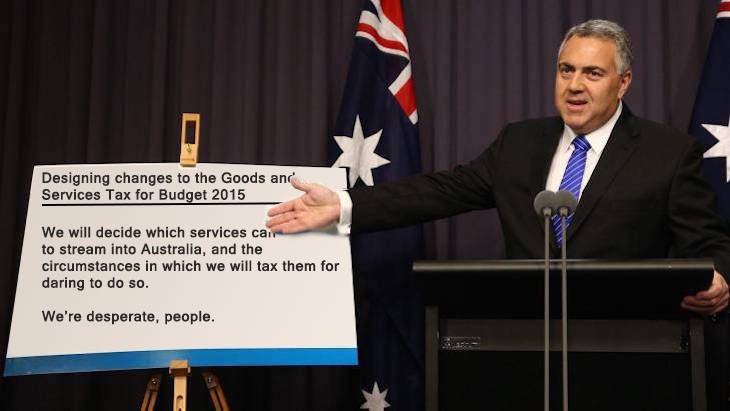
It’s no longer being considered; Tony Abbott and his conservative coalition are proposing their own “giant new tax on everything” which will greatly extend the reach of the GST to digital downloads into Australia. Clearly the government must be hard up to come up with such a desperate measure — I mean look, poor Joe has to resort to using a wooden easel to hold up his graph which supposedly supports his argument.
There’s actually two measures being announced, but it seems they will kind of work hand in hand to push up the already-high costs of most tech in Australia.
Avoiding paying tax on profits in Australia
Australia already has fairly stringent anti-avoidance rules when it comes to taxation and shifting profits offshore — these can be found in Part IVA of the Income Tax Assessment Act 1936. It is these provisions which Hockey proposes to bolster; it wants to make it easier for the Australian Taxation Office (ATO) to go after companies that use offshore havens and complex cross-border structures to minimise or avoid paying tax in Australia. This doesn’t relate so much to GST (which is separate) but tax on profits/income earned in Australia.
Lance Cunningham, tax director of firm BDO, put the changes simply:
“So if you have an arrangement where you would have had a permanent establishment and profits in Australia but instead you arrange it to be offshore for a tax benefit, that’s where this new rule might apply.”
The way Part IVA of the Tax Act works is that this rule won’t apply universally; it’s applied on a case-by-case basis when the ATO identifies a problem. And therein lies the actual problem with what’s being proposed. In order for the provisions of Part IVA to be brought into play, there’s a threshold test and (unless that is significantly altered), the provisions are unlikely to affect most multi-nationals.
University of Sydney associate professor Anthony Ting said one of the reasons that the current Part IVA was unlikely to be effective to deal with most international structures was the requirement that the ATO prove the dominant purpose of a company entering into a scheme is for a tax benefit.
In simple terms, is the dominant purpose for Google charging Australian customers from Hong Kong (for Nexus phones, for example) to avoid paying Australian tax? Or, more likely, is it because phones across much of Asia Pacific are shipped (and billed) out of Hong Kong because its a regional hub?
Even if the government were to lower the threshold, by changing dominant purpose to a purpose, the ATO still has to prove that a purpose for companies acting this way is to minimise tax. Given the investigative resources the ATO would need to apply to actually gather evidence to support such an assertion, this seems doomed to fail.
Applying the GST to digital downloads and services into Australia
The second announcement is that the government will ‘level the playing field on the GST’ by extending the consumption-based tax to digital products, a move said to raise an additional $350 million each year (some in the media have talked about this helping bring the budget back to surplus which is absolute nonsense; the GST is not a federal revenue, it’s a transfer payment which is directed straight back to the states).
For those playing along, this has been dubbed the ‘Netflix tax’, though Treasurer Hockey has been rather careful not to name names. Netflix, of course, must be in his sights, as are other multinationals in the digital download space – Google, Apple, Microsoft, Steam, to name but a few.
How exactly this will be implemented, much less enforced, is subject to speculation at the moment, but the motivation is clear; Hockey to “ensure that the suppliers of digital products and services into Australia charge the GST on those products”, stating “it is plainly unfair that a supplier of digital products into Australia is not charging the GST whilst someone locally has to charge the GST. When the GST legislation was originally drafted, it did not anticipate the massive growth in the supply of digital goods like movie downloads, games and eBooks from overseas.”
No, that’s undoubtedly true, but think about what Hockey is actually proposing.
The GST was already unpopular when it arrived fourteen years ago, because it created millions of additional tax collectors; no longer was tax collection solely the job of the ATO, but every business in the country over a certain threshold had to charge GST on its goods and services, and remit that tax to the ATO quarterly. It’s a pain in the neck made somewhat easier by computer accounting packages, but ask any small business owner — the GST is still a pain.
What Hockey seeks to do is create further tax collectors. He wants Netflix, for example, which has no presence in Australia beyond making its streaming service available to Australians, to levy, collect and remit GST on its service charges.
Hang on a minute, you might say, Netflix already charges VAT to customers in the UK, even though it doesn’t have a presence in the UK. That’s right. it does. Netflix’s delivery into the UK is based from Luxembourg, which has its own VAT, and it is that VAT which Netflix levies, at a much lower rate than the UK’s VAT. In other words, Netflix charges the tax that applies in the jurisdiction it operates from, not that it delivers to.
How would that apply to Netflix in Australia, when it delivers from the US? Well, US sales tax generally only applies based on where the service is delivered to. It doesn’t apply to export sales. We’ve been aware of this for years, as US online merchants don’t charge sales tax to purchases made from Australia, and equally, Netflix doesn’t charge sales tax on services it provides into Australia.
Netflix is just one example. Many other companies deliver product and services into Australia, and some of them (Google for example) absolutely do have a presence here. However, that presence is limited; Google’s local presence certainly doesn’t mirror what exists overseas, and it isn’t the supplier insofar as most sales of Google services into Australia are concerned.
Exactly how the Australian government plans to require foreign companies to collect GST for services delivered into Australia is unclear, but it seems one that’s almost certainly not going to work the way they think it will. There’s quite a large incentive for companies not charging GST if they can avoid it; it makes the end-product cheaper for the customer, and that’s a good thing in a market where we already (generally speaking) pay more.
One need not apply too much imagination to consider that companies potentially affected by the GST changes will put up a bit of resistance, and will find a way around any changes made. In simple terms, I don’t expect to see GST actually charged on Netflix subscriptions any time soon.
The Budget will be handed down this evening at 7.30pm, and while we expect there might be a little more detail about how these two proposed tax changes might look, the actual draft legislation and explanatory memoranda which explain the finer detail is likely some months away. We’ll soon find out, I guess.





You’re kidding right? The overseas company has every right to tell the ATO to get stuffed.
It’s a pretty simple equation really – tax should be levied upon companies based on the customer’s place of residence. ie when I buy music from Google (as an example), Google should pay tax to ATO. Who cares where the company is based, it operates with a commercial interest and benefits from it’s operations due to sales. Where the sales are made, is where the tax applies to the company. If the proposed tax updates don’t collect tax in this manner, it’s the largest missed opportunity in the history of tax reform.
“How would that apply to Netflix in Australia, when it delivers from the US?” Are you SURE it’s delivered from the US? From what I’ve read Netflix installs a lot of local server infrastructure to deliver the service to Australian customers. So it’s delivered TO Australia FROM Australia. Why shouldn’t they pay tax? Why should they be exempt when local companies like Stan have to pay tax? Before you know it there will be no local businesses left because the playing field is stacked to overseas companies so we can all save a dollar or two a month – where’s… Read more »
I suppose the parallel would be if I wanted to stream content into the US, and I used infrastructure in California to do it. Would I have to charge Californian (and other states’) sales tax, even though I’m a company based in Australia? Probably not. I’m not sure the presence of server infrastructure really makes much difference, it’s where the business is located. It’s probably an artificial distinction, but nonetheless, the GST law (as it stands) uses that to determine whether GST is applicable or not. At present, it isn’t, because Netflix doesn’t have its business here, even though it… Read more »
Google Play Music All Access is invoiced through “Google Ireland”, Kogan purchases often (but not always) go through Kogan Hong Kong to avoid charging GST – I feel like that is the kind of thing they’ll be trying to target. Kogan is probably an easy target because they’re clearly an Australia company – but good luck to them applying Australian taxation laws to online international sales.
These are the same idiots who told the tax office to stop chasing Rupert Murdoch over his 440 million dollar tax bill – where he magically transformed a profit earned in Australia into a loss and claimed a tax deduction from back in the 90’s.
Excellent analysis Chris.
I wonder how this may affect Kogan HK – all dealings are with Kogan Australia – payment, warranty, sales, service – but the phones and tablets are from Kogan HK with no GST levied.
There’s also the TRS, will we still be able to claim back GST on phones/tablets/items that are being taken out of the country on holidays and business trips? I suppose we’ll find out more over the next few days.
Best of luck Joe. Though I expect without a co-ordinated approach multinationals will continue to avoid tax.
Brilliant discussion, it’s nice to see proper articles amongst the ordinary blog echo chamber.
Hearing, but not doing.
Good luck enforcing this.